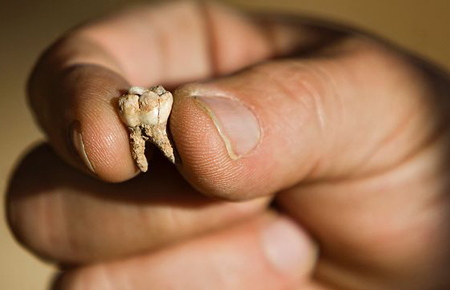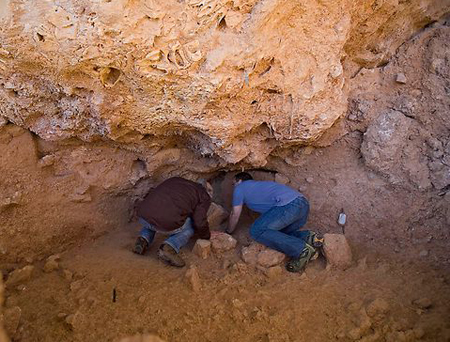The Middle East may be the cradle of humanity
The fact that archaeologists discovered the human remains dating back 400,000 years in Israel could force the scientific community to rewrite the entire evolutionary story of humanity.
>>>Proof of human ancestors of Asian origin

A tooth dated 400 thousand years that Tel Aviv University archaeologists found in Qesem cave in central Israel. (Photo: AP).
The scientific world has always believed that modern people (Homo sapien) evolved in Africa about 200,000 years ago. Then our ancestors migrated north, across the Middle East to Europe and Asia. So Africa is likened to the cradle of mankind.
Recent archaeologists have found many ancient human remains in China and Spain - two non-African countries. However, such evidence has not changed the view of the scientific world on the hypothesis of human cradle.
Recently, while excavating a cave called Qesem near the city of Rosh Ha'Ayin in central Israel, archaeologists from Tel Aviv University found eight human teeth dating back to 400 thousand years, the AP said. These are the most ancient human remains that scientists have ever known.
8 teeth discovered by Israeli archaeologists are the same size and shape as modern humans' teeth.
In addition to teeth, archaeologists also find evidence of the existence of a complex human society. Members of that society use many prehistoric tools, such as sharp stones to cut meat or cut firewood. They hunt for wild animals, gather fruits and vegetables, exploit stones for crafting tools.

Two archaeologists look for ancient human remains in Qesem cave. (Photo: AP).
This finding, published in the American Journal of Physical Anthropology, suggests that Africa may not be the cradle of humanity as we thought. Instead modern humans evolved in the Middle East and radiated to other places on the earth.
Professor Avi Gopher, an archaeologist at Tel Aviv University, said he and his colleagues will continue to study to see if the Middle East is a cradle of humanity.
' If that proves true, we will have to rewrite the entire evolutionary history of humanity ,' Gopher remarked.
Paul Mellars, a prehistoric expert at Cambridge University in England, thinks that the Gopher group's discovery is important, but it is still too early to conclude the teeth belong to modern people. According to him, they may belong to the Neanderthals, a race of relatives with our ancestors.
- The Syrian war caused an unusual sandstorm in the Middle East
- Comfortable cradle
- Why is unusual snowfall in Vietnam, Egypt and the Middle East?
- The cause of sand storms raging throughout the Middle East
- Things to know about dangerous diseases Mers
- Mysterious wheel drawings in the Middle East
- Strange virus in the Middle East is about to cause a new SARS pandemic?
- Camels cause Middle East respiratory distress syndrome
- High tech shelters can protect millions of poor children around the world
- New archaeological findings in North Africa may
- APEC, Africa and the Middle East strengthen bird flu alert
- The mysterious ancient stone circles in the Middle East
 'Fine laughs' - Scary and painful torture in ancient times
'Fine laughs' - Scary and painful torture in ancient times The sequence of numbers 142857 of the Egyptian pyramids is known as the strangest number in the world - Why?
The sequence of numbers 142857 of the Egyptian pyramids is known as the strangest number in the world - Why? History of the iron
History of the iron What is alum?
What is alum?